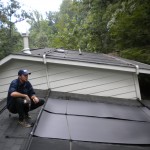Solar Pool Heating Systems are Ideal for Atlanta Pool Owners
 Here in Atlanta, a majority of pools are not heated. Most people start swimming on Memorial Day and cover their pool up around Labor Day in the beginning of September. That means June, July, and August are the only time the pool sees action. I’m a swimming machine and would love to have a pool if I had the resources to do so. However, even for someone who loves swimming like I do, owning a pool takes a lot of upkeep for a paltry 3 months usage out of the year.
Here in Atlanta, a majority of pools are not heated. Most people start swimming on Memorial Day and cover their pool up around Labor Day in the beginning of September. That means June, July, and August are the only time the pool sees action. I’m a swimming machine and would love to have a pool if I had the resources to do so. However, even for someone who loves swimming like I do, owning a pool takes a lot of upkeep for a paltry 3 months usage out of the year.
That’s why a solar swimming pool heater makes so much sense in the sunny Atlanta climate. The Fafco solar pool heating system heats your pool up 10-15 degrees on a sunny day and allows you to start using your pool in late March and swim in your pool comfortably all the way through October. That’s 4 extra months of usage which doubles your time to enjoy the swimming pool over the course of the year.
Personally, I have a bad knee and the doc won’t let me run anymore but tells me to swim laps since it doesn’t impact my knee. I know I need to do this for exercise but I hate all the chlorine in the local indoor pools. If I had an outdoor pool, I’d actually listen to the doctor. Adding an extra 4 months usage in the year is huge for someone like me. My little girl has no faulty joints and she will swim until I force her to get out of the pool. Then she sleeps like a baby after a day at the pool which also makes me happy. I’d much rather see her exhaust herself playing in the swimming pool than watching stupid television shows or playing video games. If she could go swimming in April, I’d be pleased as punch.
Here’s how the system works. It’s really quite simple. We need 60-80% of the surface area of your pool in solar panels dependant upon which direction your home is oriented. We use the existing pump in your pool to divert the water via PVC pipe to the panels on the roof (or platform next to the pool if roof is not an option). The PVC pipe feeds into the bottom of the panels then filters up through the solar collectors gathering heat as it makes its way to the header pipe on the top of the panel. The warm solar-heated water then filters back into the pool. You can manual turn the diverter on or off but most people buy a control panel and they set the temperature they desire allowing the diverter valve to to be turned on and off automatically to regulate temperature.
Let’s talk about cost then I want to also touch on the environmental impact of the product. The cost of the panels plus necessary hardware ranges from $330-$395 per panel dependant upon the size of the panel. A 30’x15’ pool generally would need 6 large panels so that’s approximately $2400. Another panel assembly pack is required but only costs about $80 and a good quality temperature controller costs about $250. So the cost of the hardware is approximately $2800. The installation usually runs about $1500 but can be more or less dependant upon the difficulty of the roof pitch and overall installation. The panels are under warranty for 12 years. We just did a warranty replacement of the two panels in the picture above and Fafco was very easy to deal with. The panels we were replacing were 9yrs old had a couple cracks in them from this past winter. The cost to the client for the brand new replacement panels was zero. That’s a sweet warranty in my opinion.
In respect to monthly costs, the cost of running the solar water heater system is zero since the sun is doing all of the work. Compare that to the U.S. Dept of Energy’s average annual cost of a gas pool heater if kept at 78 degrees in Atlanta at a nasty $1704. http://www.energysavers.gov/your_home/water_heating/index.cfm/mytopic=13180 An electric heat pump at the same temperature costs $840 a year. The numbers speak for themselves.
If you care about the environment like I do, listen to this ghastly statistic. A gas-heated swimming pool emits 4,000lbs of CO2 annually, more carbon dioxide in a year than an automobile over the same time period. An electric heat pump is about half that. Either way, these stats are downright disturbing.
The bottom line is that a solar pool heating system extends the swimming season, costs nothing once installed, and has zero negative impact on the environment.
Here’s a link to Fafco with a diagram showing how this system is put together: http://www.fafco.com/sph/how.aspx


